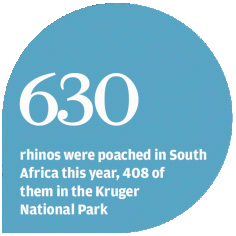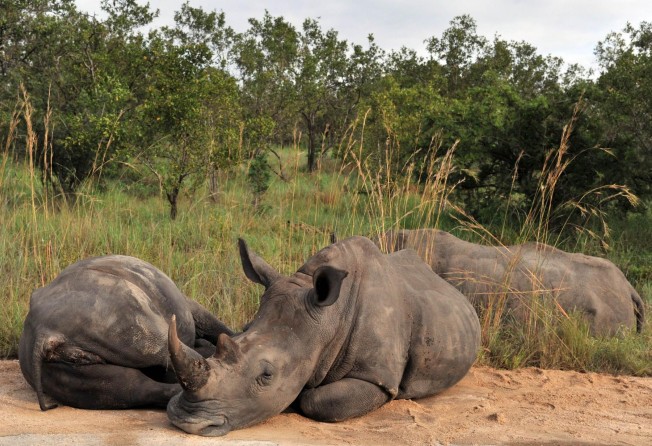
South Africa may send rhinos abroad to beat poachers

South Africa plans to move up to 500 rhinos from its Kruger National Park to counter a wave of poaching of the animals for their horns, highly prized in newly affluent Asian countries as a sign of wealth.

"We have to take rhinos to where they are safe," Kruger head vet Markus Hofmeyr said.
The latest census from Kruger shows it has between 8,400 and 9,600 white rhinos. Despite the poaching, the population has stabilised with an annual mortality rate, including poaching, of around 8 per cent matched by an 8 per cent birth rate.
The removals will be a huge operation that will involve tracking down the animals in rugged and remote bush and then shooting them with tranquiliser darts from helicopters. Moving one could cost US$1,500 or more.
"It is a mammoth task. We are looking to numbers of up to 500," Environment Minister Edna Molewa said. "We must start soon."
Kruger rangers move some rhinos every year, with park management using the proceeds from sales to private reserves to help fund conservation.
A record 250 rhinos were moved in 2009 but the scale of the poaching has forced a more drastic approach.
The focus of the operation will be on Kruger's eastern border with Mozambique, one of the world's poorest countries, where poachers are lured by the promise of quick money.
Botswana in particular may be an ideal base because it has vast areas of sparsely populated and inaccessible wilderness.
South Africa is at the centre of a surge in poaching over the past few years because it is home to the vast majority of the world's population - 18,000 white rhinos and 3,000 black rhinos.
More than 1,000 were poached last year, three times the tally in 2010, to meet soaring demand for rhino horn, coveted as an ingredient in traditional medicine in China and Vietnam.
According to the Convention on International Trade in Endangered Species there has also been a shift from medicinal use to flaunting rhino horn as a sign of wealth. Its street value is estimated by some conservationists at US$65,000 a kilogram, making it more valuable than platinum or gold.
Elsewhere in Africa, elephants are being poached at an alarming rate for the ivory in their tusks, while another species, the pangolin - a kind of anteater - is hunted because its scales are a prized fashion product and its meat a delicacy.